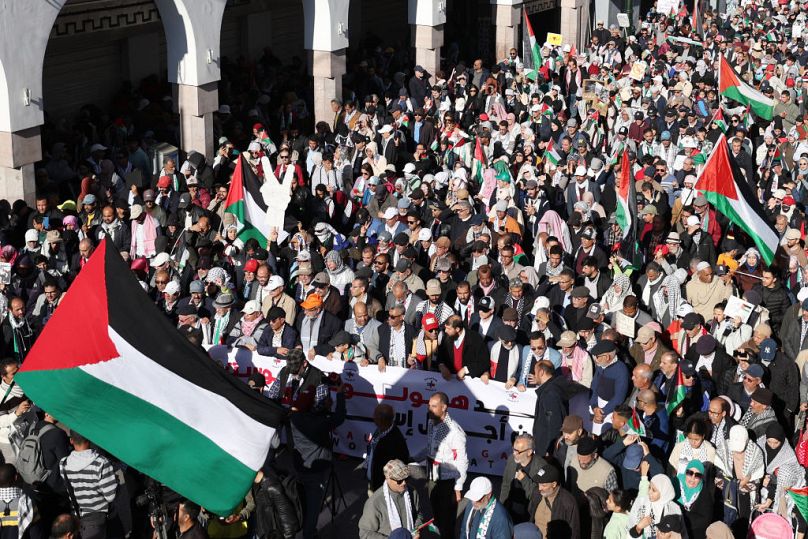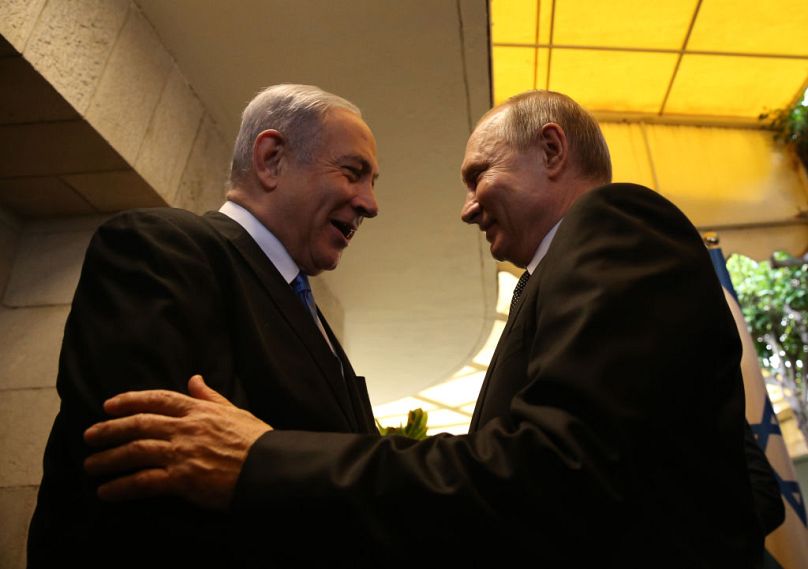The latest developments from the Israel-Hamas war.
Hamas: No hostage will leave Gaza ‘alive’ without ‘negotiations’
Abu Obeida, the spokesperson for Hamas’s Qassam Brigades has announced that Israeli captives, taken during the attack on 7 October, will not be released by military force.
 ADVERTISEMENT
ADVERTISEMENT
 ADVERTISEMENT
ADVERTISEMENT
“We tell the Israelis that Netanyahu, Gallant, and others in the war cabinet cannot bring back their captives without negotiations. The latest killing of a captive they tried to take back by force proves that,” he said in a pre-recorded video message.
Gaza health ministry: 18,000 Palestinians killed since start of war
The Hamas-led Gaza health ministry has announced that some 18,000 Palestinians have been killed since the war broke out on 7 October.
That number is up from the figure of 17,700 reported yesterday.
The health ministry recorded a further 297 deaths and more than 550 injuries over the past 24 hours.
The ministry also added a total of 49,500 people have been injured since the start of the conflict.
The figures have not been independently verified. Israeli officials repeatedly say they believe the number to be significantly lower, accusing Hamas of inflating estimates.
Thousands of Moroccans take to the streets to denounce Gaza ‘genocide’
Several thousand of Moroccans have taken to the streets of Rabat, demonstrating to denounce a "genocide" in Gaza and demand a break in relations with Israel.
A large crowd marched in the centre of the capital, behind a large banner declaring "against the Holocaust in Gaza" and for "repealing normalisation".
Since the end of 2020, the kingdom has established all-out relations with Israel in return for the recognition by the United States of Morocco's sovereignty over the disputed territory of Western Sahara.
Waving Palestinian flags and wearing keffiyehs, demonstrators marched against "war crimes and genocide" in Gaza at the call of the "national action group for Palestine", bringing together left-wing groups and the Islamist Party of justice and development.
UN: Food ‘used as weapon of war’ in Gaza
UNRWA’s commissioner general Philippe Lazzarini has claimed that, in Gaza, “humanitarian aid has been made conditional. Humanitarian assistance is withheld or delivered according to political and military agendas to which the United Nations is not privy”.
The head of the UN agency providing relief to Palestinian refugees was writing an opinion piece in the Los Angeles Times.
He added that “food, water and fuel are being systematically used as weapons of war in Gaza, as is disinformation”.
“Attacking and trying to discredit humanitarian organisations such as [UNRWA] is yet another means of waging war and compromising the humanitarian response, further weakening the protection of civilians and civilian infrastructure,” Lazzarini added.
In the article, he also wrote that “humanitarian aid is a strategic dimension of foreign policy and diplomatic competition – an instrument of power and war. In Gaza, humanitarian assistance is being manipulated to serve political and military objectives, another breach among many in this war”.
Netanyahu expresses ‘dissatisfaction’ to Putin over Russian vote at UN
Israeli Prime Minister Benjamin Netanyahu expressed his "dissatisfaction" to Russian President Vladimir Putin on Sunday after Russia voted in favour of a ceasefire between Palestinian Hamas and Israel in Gaza at the UN Security Council.
“The Prime Minister expressed his dissatisfaction with the anti-Israel positions adopted by Russian delegates at the UN and other forums,” a statement from Netanyahu’s office said, following a telephone conversation between the two leaders.
The statement also added that Netanyahu “strongly criticised the dangerous cooperation between Russia and Iran”.
The comments come as Sergey Lavrov, Russia’s foreign minister, says “Hamas attacks do not justify punishment of Palestinian people”.
Saying it is not acceptable for Israel to use Hamas's attack on 7 October as justification for the collective punishment of the Palestinian people, he added that the offensive "did not happen in a vacuum".
He also renewed calls for international monitoring on the ground in Gaza.
Russian president Vladimir Putin has blamed the war between Israel and Hamas on the apparent failure of years of US diplomacy in the Middle East on a frequent basis.
Experts say he’s keen to position Russia as an important player within the region.
Guterres deplores UN 'paralysis' over Gaza
UN Secretary-General Antonio Guterres has deplored the "paralysis" of the United Nations in the face of the war between Israel and Palestinian Hamas in the Gaza Strip, saying he regretted that the Security Council had not voted in favour of a ceasefire.
Speaking at the Doha Forum in Qatar, Guterres said the Security Council was "paralysed by geostrategic divisions", thus compromising its ability to find solutions to the war.
“The authority and credibility of the Security Council have been seriously compromised” by its late response to the conflict, a damage to its reputation aggravated by the veto opposed Friday by the United States to a resolution calling for a ceasefire in Gaza, he said.
The draft resolution was prepared after the UN Secretary General's unprecedented invocation of Article 99 of the United Nations Charter, allowing him to draw the attention of the Security Council to a matter which "could endanger the maintenance of international peace and security.
“I reiterated my call to declare a humanitarian ceasefire… unfortunately, the Security Council failed to do so,” Guterres said, adding, “I can promise that I will not give up.”
The Americans, the closest allies of Israel, reiterated their hostility to a cease-fire on Friday.
“We are at serious risk of the collapse of the humanitarian system,” Guterres also warned at the Doha forum.
“The situation is rapidly evolving into a catastrophe with potentially irreversible implications for the Palestinians as a whole and for peace and security in the region.”
War in Gaza is having 'catastrophic' impact on health - WHO boss
The war in Gaza between Israel and Hamas is having a "catastrophic" impact on health, Tedros Adhanom Ghebreyesus, head of the World Health Organisation (WHO), has said.
"The impact of the conflict on health is catastrophic" and health workers are "doing their best in unimaginable conditions", he said, at the opening of a special WHO meeting on sanitary conditions in the Palestinian territories.
Fighting ramps up further still as US lends support
Heavy fighting raged into Sunday in the southern Gaza town of Khan Younis, as Israel pressed ahead with its offensive after the US blocked the latest international efforts to halt the fighting and rushed more munitions to its close ally.
Israel has faced rising international outrage and calls for a cease-fire after the killing of thousands of Palestinian civilians and the displacement of nearly 85% of Gaza's 2.3 million people within the besieged territory, where UN agencies say there is no safe place to flee.
The United States has lent vital support to the offensive once again in recent days, by vetoing United Nations Security Council efforts to end the fighting that enjoyed wide international support. They have also pushed through an emergency sale of over $100 million (€93m) worth of tank ammunition to Israel.
The US has pledged unwavering support for Israel's goal of crushing Hamas' military and governing abilities in order to prevent any repeat of the 7 October attack that triggered the war.
Israeli forces continue to face heavy resistance, even in northern Gaza, where entire neighbourhoods have been flattened by air strikes and where troops have been operating for over six weeks.
In Khan Younis, where ground forces moved in earlier this month, residents said they heard constant gunfire and explosions through the night as warplanes bombarded areas in and around the southern city, Gaza's second largest.
Situation in Gaza ‘hell on earth’ - UNRWA chief
Speaking at the Doha Forum currently taking place in Qatar, the head of the UN’s agency for Palestinian refugees (UNRWA) has called for an urgent humanitarian ceasefire while decrying the devastating humanitarian toll in Gaza. He also warned that the region is akin to “hell on earth”.
“By any description, it is definitely the worst situation I have ever seen,” Philippe Lazzarini said.
“People are coming to the UN to seek protection, but even the blue flag is not protected anymore. By any account, the situation has reached a catastrophic nature,” he added.
Lazzarini said the world has failed the Palestinian people, also warning that the UNRWA is on the verge of collapse in Gaza..
Nowhere safe for Gazans to go?
Israel ordered the evacuation of the northern third of the territory, including Gaza City, early in the war, but tens of thousands of people are believed to have remained there, fearing that the south would be no safer or that they would never be allowed to return to their homes.
With the war in its third month, the Palestinian death toll in Gaza has surpassed 17,700, the majority women and children, according to the Health Ministry in the Hamas-controlled territory. The ministry does not differentiate between civilian and combatant deaths.
Israel holds Hamas responsible for civilian casualties, saying it uses civilians as human shields in dense residential areas. The military says 97 Israeli soldiers have died in the ground offensive. Palestinian militants have also continued firing rockets into Israel.
Israel says it has provided detailed instructions for civilians to evacuate to safer areas, even as it continues to strike what it says are militant targets in all parts of the territory. Thousands have fled to the southern town of Rafah and other areas along the border with Egypt in recent days - one of the last areas where aid agencies are able to deliver food and water.
Israel has designated a narrow patch of barren southern coastline, Muwasi, as a safe zone. But Palestinians described desperately overcrowded conditions with scant shelter and no toilets. They faced an overnight temperature of around 11 degrees Celsius (52 degrees Fahrenheit).
Alleged antisemitic attack in New York sees Shtreimel stolen from Jewish man
A neighbourhood watch group - Boro Park Shomrim - in New York city has released footage appearing to show a motorcyclist snatching and stealing a shtreimel hat from a Hasidic man in Brooklyn, a district of New York City.
The group alleged the attack was an antisemitic incident and urge anyone with information to get in touch with the local police force.
Detentions of Palestinians by Israeli soldiers increase
In recent days, videos and photos have emerged showing the detention of dozens of men who were stripped to their underwear, bound and blindfolded. The Israeli military says it is detaining people as it searches for remaining pockets of Hamas fighters.
Israel's Channel 13 TV broadcast footage showing dozens of detainees stripped to their underwear with their hands in the air. Several held assault rifles above their heads, and one man could be seen slowly walking forward and placing a gun on the ground before returning to the group. Israeli media pointed to such scenes as evidence that Hamas was collapsing in the north.
Men from a separate group of detainees who were released on Saturday told The Associated Press they had been beaten and denied food and water.
Osama Oula said Israeli troops had ordered him and others out of a building in Gaza City before bounding their hands with zip ties, beating them for several days and giving them little water to drink. Ahmad Nimr Salman showed his hands, marked and swollen from the zip ties.
He said the troops asked if they were with Hamas. "We say ‘no,’ then they would slap us or kick us." He said his 17-year-old son Amjad is still held by the troops.
The group was released after five days and told to walk south. Ten freed detainees arrived at a hospital in Deir al-Balah on Saturday after flagging down an ambulance. The Israeli military had no comment when asked about the alleged abuse.












